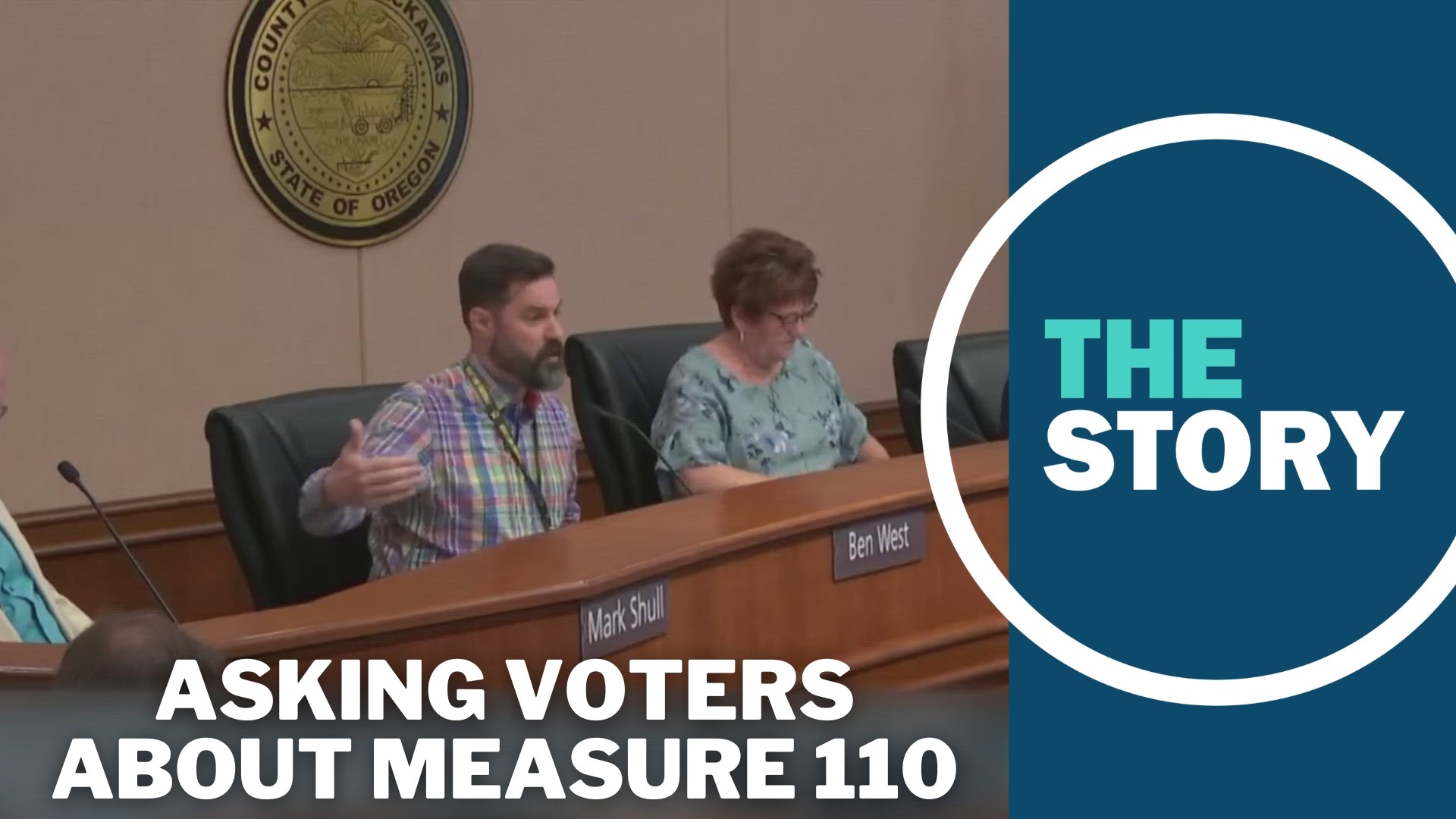CLACKAMAS, Ore. — Less than three years ago, Oregon voters decriminalized drugs and allocated funding for drug treatment programs through Measure 110 — approving it with more than 58% of the vote.
Since then, the measure's reputation has suffered amid a growing drug crisis, often associated with homelessness. And while no significant efforts to repeal the measure have yet materialized, Clackamas County voters will soon have a chance to be heard on the issue, if only in a symbolic way.
Clackamas County has about 310,000 registered voters. Roughly 102,000 are unaffiliated, 102,000 are Democrats and 83,000 are Republicans. But based on the way the county votes as a whole, it's quite possibly the most conservative part of the Portland metro area.
Commissioners have agreed to put two questions to voters next year, during the May presidential primary election. They want voters to answer whether state lawmakers representing Clackamas County should be directed to do anything they can in order to fix or repeal Measure 110.
Commissioners also want voters to decide if they should demand that Gov. Tina Kotek call a special session to fix or overturn Measure 110.
'We've got to stop it'
No matter how the vote goes, neither question is binding in any way. Nonetheless, Chair Tootie Smith said she hopes it encourages other government leaders to follow suit.
"It is sending a message and I hope it makes a difference," Smith told The Story's Pat Dooris. "I hope other jurisdictions will take what we're trying to do, do the same thing in either their cities or counties to tell the legislature, 'You need to fix this problem.' There are several bills in the legislative session dealing with Measure 110 to try to either change them or tweak them. And all of them died. Didn't do anything. Instead the legislature's answer is to spend more money on housing when we're not addressing why people need housing — why we have a homeless situation, and this is a very large cause of homelessness."
There is certainly an intersection between homelessness, drug use and mental illness, but few experts downplay the need for housing as a big piece of the solution to homelessness in the way that Smith does. More on that later.
Smith said she personally believes Measure 110 should be repealed, and she's of the opinion that a lot of voters now regret their support of the ballot measure.
Pat Dooris asked Smith why, if she feels so strongly about it, she does not start a statewide initiative petition to repeal the law instead of asking her county's lawmakers to look into fixes.
"It's very difficult to gather enough signatures — as you know, Pat — statewide to do that," Smith replied. "It's really not up to the board of county commissioners to do an initiative petition. We could support those efforts. But this streamlines the process. It tells the legislature, 'You need to step up, and you need to take the responsibility of what's happening in our state.' You know, Pat, Oregon has become a laughingstock nationally. This is the only state in America who has de-criminalized illicit and harmful drugs and we've got to stop it."
The most direct route to "stop it" would still be through an initiative petition, just like it brought Measure 110 into being, but nonetheless Clackamas County voters will be asked to be a bellwether for the governor and state lawmakers.
Commissioners heard that putting the two questions to voters next spring will cost between $80,000 and $90,000 from the county's general fund. Commissioner Ben West addressed that issue during Wednesday's meeting.
"And by the way, we — I know it's expensive," West said. "Tens of millions of dollars have been spent on this really bad policy at a cost of a lot of lives. And a lot of heartache. And a lot of social strife. So this is a drop in the bucket to the pain that we're all feeling."
Commissioner Martha Schrader expressed her support for the spirit of the question, and her opposition to Measure 110, but also said that she thought it was a pointless expense.
Ultimately both questions were approved and will go before voters next May.
The background
Clackamas County commissioners' interest in a referendum on Measure 110 came up during a dizzying discussion of transitional housing earlier this year. In February, Chair Tootie Smith cast the deciding vote in favor of an initiative, known as Project Turnkey, to purchase a Quality Inn near I-205 and Sunnyside Road and turn it into housing for people now on the streets.
About a month later, Smith abruptly reversed her decision at an emergency meeting and killed the purchase. She cited growing public pressure against the project. The county also faced a lawsuit from a nearby property owner, and the Business Tribune reported that Smith had been threatened with censure from the Clackamas County Republican Party.
That reversal cost the county $8 million in grant funds plus a $150,000 down payment on the motel. It also cost the erstwhile project manager his job.
After that, commissioners began casting about for other responses to homelessness in the area — apparently seeking to prove that they were still taking the issue seriously, even if they'd shot down a project intended to help address it. A lofty resolution approved by the board didn't make a lot of concrete pledges in that regard, but it did clearly link homelessness with issues of addiction and mental health.
In a statement after her reversal, one of three steps that Smith listed going forward for addressing homelessness was to "bring a referral to the voters on the question of whether the legislature should overturn Measure 110 on the legalization of drugs that has a role to play in the growing scourge of homelessness and addiction issues." The idea of creating an advisory question for a ballot measure referred to voters has been percolating ever since.

